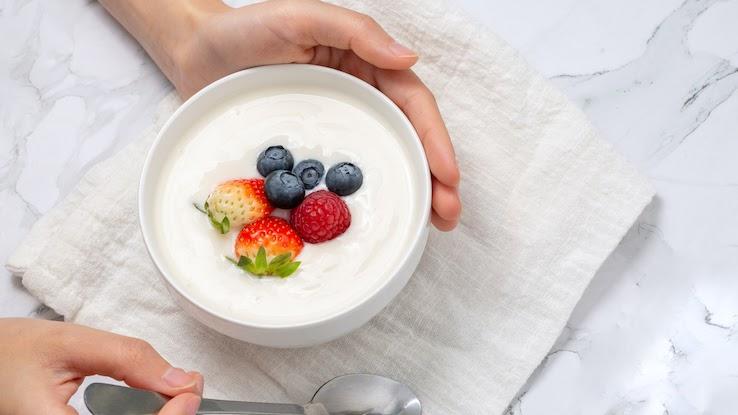
Diets for Stomach Ulcers: Tips on What to Eat
If you have peptic ulcer disease, which causes lesions known as ulcers to form in your stomach, proper treatment relies on modern medicine. However, changing your diet and engaging in stress-reduction practices can be powerful allies in your treatment.
The most common cause of peptic ulcer disease is infection with a bacterium called Helicobacter pylori (H. pylori), and the second most common cause is overuse (long-term or high-dose usage) of nonsteroidal anti-inflammatory drugs (NSAIDs) such as aspirin or ibuprofen. Heavy alcohol consumption, tobacco use and inadequate nutrition are also thought to increase your chance of developing a stomach ulcer.
Improving your eating habits may play a role in helping your body heal your ulcers. But what should you eat if you have stomach ulcers? There are several foods you’ll want to start consuming more of — and some to avoid.
Try These Foods If You Have a Stomach Ulcer

Fiber is extremely important in maintaining digestive health, especially if you have a peptic ulcer. Fresh fruits and vegetables provide lots of fiber, and they’re beneficial sources of important vitamins, minerals and antioxidants that could help protect and maintain a healthy stomach. Try to consume plenty of soluble fiber, which is found in oatmeal, lentils, beans, barley, peanut butter, nuts, fruits and leafy green vegetables. An over-the-counter supplement that contains psyllium husk may help to keep your bowels regular. It acts as a prebiotic — a substance that helps healthy gut bacteria thrive.
Fruits and vegetables that have flavonoids and other compounds such as coumarins, alkaloids, terpenoids, tannins and phenolic acids are thought to have medicinal or functional properties in addition to the nutrition they offer. In strawberries, substances called polyphenols seem to help heal stomach ulcers.
Foods that are rich in flavonoids, antioxidants and other phytochemicals include:
- Strawberries
- Apples
- Celery
- Cranberries
- Onions
- Garlic
- Green tea
Although milk usually makes the “foods to avoid” list because it promotes stomach acidity, some types of yogurt or other fermented dairy products may actually be helpful for stomach ulcers. Evidence from animal studies suggests that yogurts with certain probiotic bacteria, such as lactobacilli, may help to heal gastric ulcers. And if you don’t already take one, consider a multivitamin. Some evidence suggests that vitamin deficiencies make it harder to heal from a peptic ulcer.
What Foods Should You Avoid When You Have a Stomach Ulcer?

Generally, foods that are high in fat or acidity or that tend to give you heartburn are things to avoid. These triggering foods vary from person to person, so it may take some trial and error to find out what foods and beverages you should avoid.
Consuming these foods won’t necessarily cause or worsen a stomach ulcer, but they might increase your digestive discomfort. You may want to avoid the following unless you know they won’t aggravate your symptoms:
- Coffee: Whether caffeinated or decaffeinated, coffee is an acidic drink that may irritate your stomach lining. Chocolate also contains caffeine, so it can be an irritant, although not everyone reacts the same way.
- Carbonated beverages: Also acidic in nature, sodas and carbonated beverages are drinks to avoid.
- Fatty foods: Foods high in saturated fats — such as fatty cuts of red meat, dishes made with heavy cream or buttery pastries — tend to promote inflammation and ulcer discomfort.
- Tomatoes, citrus fruits and their juices: Tomatoes and tomato sauces are very acidic. Citrus fruits, such as lemons, oranges, grapefruits, tangerines and limes, are higher in acidity than other fruits. To reduce the risk of irritation, try cutting out these acidic items from your diet.
- Spicy foods: If spicy foods tend to upset your stomach, by all means cut them out of your diet. However, there’s no evidence that doing so will help heal an ulcer. The spices most likely to upset your stomach are black pepper, chili pepper or powder, cayenne pepper, mustard seed and nutmeg.
- Alcohol: Alcohol stimulates acid secretion in your stomach, and excessive intake of alcohol may make your symptoms stronger or your treatment less effective. Moderate alcohol consumption may not be bad for your peptic ulcer, but stick to no more than one or two drinks per day.
- Smoking: According to the National Institutes of Health, cigarette smoking increases a person’s chances of developing a stomach ulcer. It also slows down the healing process and can worsen the condition.
Healthy Alternatives to Trigger Foods

Having a stomach ulcer doesn’t mean that you can only eat bland or textureless foods. Fortunately, many milder, low-fat alternatives are available. Consider replacing your trigger foods with some of the following options to see if this results in a reduction in your ulcer discomfort.
Instead of fatty cuts of red meat, try:
- Poultry with the skin and fat removed
- Fish (if you choose canned, make sure it’s packed in water instead of oil)
- Tofu, beans and legumes
Instead of sodas or coffee, try:
- Fruit juices (except for citrus juices)
- Water
- Mild herbal teas
- Fermented dairy beverages, such as kefir
Instead of buttery pastries, try:
- Whole grain breads, tortillas and pita bread
- Desserts made with whole grains
Instead of creamy, high-fat condiments or spicy, acidic sauces, try:
- Non-fat mayonnaise
- Low-fat salad dressings
- Honey
- Fresh or dried herbs
- Moderate salt and pepper
Sometimes it’s not what you eat, but how you eat. Try to avoid eating large, heavy meals and eat your last meal of the day three or four hours before bedtime. Keeping a food diary for a few weeks can help you identify the foods that ease your symptoms and those that worsen your ulcer symptoms. Sticking to a more stomach-friendly diet can take some investment and planning — but the transition to a healthier diet to ease symptoms of peptic ulcer disease will bring with it a longer list of health benefits.
Resource Links:
https://www.mayoclinic.org/diseases-conditions/peptic-ulcer/diagnosis-treatment/drc-20354229
https://www.sutterhealth.org/ask-an-expert/answers/dietary-changes-for-peptic-ulcer
https://www.stewartmedicine.com/wp-content/uploads/2017/10/ulcers.pdf
https://www.healthlinkbc.ca/healthy-eating/peptic-ulcers
https://badgut.org/information-centre/health-nutrition/diet-for-ulcer-disease/





